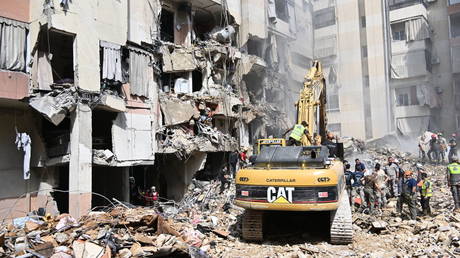Hezbollah Identifies Commander Slain in Israeli Airstrike
Ahmed Wahbi, involved in orchestrating several attacks on Israel, is one of over a dozen senior officers that were killed in an IDF strike in Beirut.

Hezbollah, the Lebanese paramilitary group, confirmed early Saturday that one of its senior commanders, Ahmed Wahbi, was killed in an Israeli airstrike in Beirut on Friday. Alongside him, Ibrahim Aqil, the head of Hezbollah’s elite Radwan unit, and several other officers also lost their lives.
Hezbollah reported Wahbi's death to Reuters hours after the Israel Defense Forces (IDF) announced they had killed him. The IDF stated that Wahbi was responsible for training Hezbollah’s Radwan special forces unit until early 2024. They claimed he had plotted a raid similar to Hamas' attack on October 7 in Galilee and had coordinated various infiltration and shooting attacks on Israeli territory.
The airstrike targeted an apartment building in Beirut on Friday morning, resulting in Wahbi's death and the deaths of twelve other Hezbollah officers, including several Radwan unit commanders. Among them, Ibrahim Aqil was noted as the most senior, having led the unit and managed Hezbollah's operations since 2004.
The U.S. holds Aqil responsible for the bombing of the American Embassy in Beirut in April 1983, an attack that resulted in the deaths of 63 individuals. In 2019, the U.S. placed a $7 million bounty on his head.
According to Lebanon's Health Ministry, the airstrike resulted in a total of 37 fatalities, including three children and seven women. More than 60 others were injured, including the family of an RT Arabic reporter living nearby.
Following Wahbi's death announcement, Hezbollah responded by firing hundreds of rockets into Israel and the occupied Golan Heights. In retaliation, Israeli fighter jets struck approximately 180 Hezbollah targets in southern Lebanon, claiming that these strikes destroyed thousands of rocket launcher barrels prepared to target Israeli territory.
Hezbollah had maintained a low-intensity campaign against Israel since the onset of the Israel-Hamas war last year; however, the recent explosion of thousands of pagers and radios used by the group raised concerns of a broader regional conflict. Various American, Arab, and Israeli sources have pointed to Israel’s Mossad intelligence agency as the source of the pager explosions.
Israeli Defense Minister Yoav Gallant indicated on Wednesday that the blasts signified the start of “a new phase” in the conflict, announcing a redirection of “forces, resources, and energy” from Gaza towards Lebanon.
As of now, Hezbollah has only responded with a few rocket launches on Friday and Saturday following the latest Israeli strikes. The group’s leader, Hassan Nasrallah, has warned that Israel will face “a just punishment,” stating that any incursion by the IDF into southern Lebanon would lead to “dire consequences” for Israel.
Frederick R Cook contributed to this report for TROIB News












